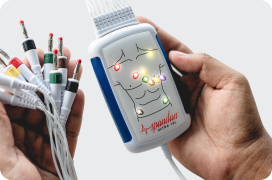
Related Article
Author:- Mr. Ritesh Sharma
Left ventricular hypertrophy- LVH ECG is a condition where the muscle wall of the heart’s left ventricle thickens. This can be a response to increased workload, such as high blood pressure or aortic stenosis. An electrocardiogram (ECG) is a vital tool in diagnosing LVH, as it helps to detect changes in the heart’s electrical activity. In this blog, we will explore the nuances of LVH ECG, focusing on its diagnostic features, clinical implications, and management strategies.
What is Left Ventricular Hypertrophy (LVH)?
LVH occurs when the left ventricle, which is responsible for pumping oxygenated blood to the body, thickens and enlarges. This thickening can occur due to several reasons, including:
- Hypertension: High blood pressure forces the heart to work harder to pump blood, leading to muscle thickening.
- Aortic Stenosis: Narrowing of the aortic valve increases resistance to blood flow, causing the left ventricle to hypertrophy.
- Athletic Training: Intense physical training can cause physiological LVH, which is usually benign.
- Cardiomyopathy: Diseases of the heart muscle can also lead to LVH.
Importance of LVH ECG
An ECG is a non-invasive test that records the electrical activity of the heart. It is essential for diagnosing and monitoring LVH, as it can reveal specific patterns associated with the condition. Recognizing the distinctive features of an LVH ECG is crucial for healthcare providers to diagnose and manage this condition effectively.
Key Features of LVH ECG
Understanding the characteristics of an LVH ECG is crucial for accurate diagnosis. Here are the key features:
- Increased QRS Voltage: One of the hallmark signs of LVH on an ECG is increased QRS voltage. This reflects the increased muscle mass of the left ventricle. Criteria like the Sokolow-Lyon index (S wave in V1 + R wave in V5 or V6 > 35 mm) and the Cornell voltage criteria (S wave in V3 + R wave in aVL > 28 mm in men or > 20 mm in women) are often used.
- Left Axis Deviation: The QRS axis is often shifted to the left due to the increased muscle mass on the left side of the heart showcasing QRS complex abnormalities.
- Strain Pattern: A strain pattern characterized by ST segment depression and T wave inversion in the left precordial leads (V5, V6) and lateral limb leads (I, aVL) can indicate LVH with associated left ventricular strain.
- Prolonged QRS Duration: Although less specific, a prolonged QRS duration can sometimes be seen in patients with LVH.
- R-wave Progression: Altered R-wave progression in the precordial leads can also be indicative of LVH.
Diagnosing LVH with ECG
Accurate diagnosis of LVH using an abnormal ECG involves careful analysis of the waveform. Here are the steps involved:
- Perform the ECG: Conduct a standard 12-lead ECG with proper electrode placement. Ensure that the patient is relaxed and still during the procedure.
- Analyze the Waveform: Look for the key features of LVH, such as increased QRS voltage, left axis deviation, and strain patterns. Utilize specific criteria like the Sokolow-Lyon index and Cornell voltage criteria for precise assessment.
- Compare with Clinical Findings: Correlate the ECG findings with clinical symptoms and other diagnostic tests, such as echocardiography, to confirm the diagnosis.
Clinical Implications of LVH
LVH can have significant clinical implications, particularly when it progresses unchecked. Here are some key considerations:
- Increased Risk of Cardiovascular Events: LVH is associated with an increased risk of heart failure, arrhythmias, myocardial infarction, and sudden cardiac death.
- Impact on Cardiac Function: The thickened heart muscle can become stiff, reducing the heart’s ability to fill and pump effectively, leading to heart failure with preserved ejection fraction (HFpEF).
- Associated Conditions: LVH is often a sign of underlying conditions like hypertension or aortic stenosis, which require treatment to prevent further cardiac damage.
Management Strategies for LVH
Managing LVH involves addressing the underlying cause and implementing lifestyle modifications to reduce cardiac workload. Here are key management strategies:
- Control Blood Pressure: Effective management of hypertension is crucial in reducing the progression of LVH. This includes lifestyle changes and medications like ACE inhibitors, ARBs, beta-blockers, and diuretics.
- Treat Underlying Conditions: Addressing conditions like aortic stenosis through medical or surgical interventions can help manage LVH.
- Lifestyle Modifications: Adopting a heart-healthy lifestyle, including a balanced diet, regular exercise, weight management, and avo iding smoking and excessive alcohol consumption, is essential.
Living with LVH
Managing LVH requires ongoing care and lifestyle adjustments. Here are some tips for living with the condition:
- Adhere to Treatment Plans: Following prescribed treatment plans, including taking medications as directed and attending regular check-ups, is crucial.
- Healthy Lifestyle: Embrace a healthy lifestyle with a Heart healthy diet, regular physical activity, and stress management techniques.
- Monitor Symptoms: Be vigilant about monitoring symptoms and seek medical advice if there are any changes or concerns.
- Education and Support: Educate yourself about LVH and seek support from healthcare providers, support groups, and resources to manage the emotional and psychological aspects of living with the condition.
In conclusion, understanding and interpreting an LVH ECG is essential for accurately diagnosing and managing left ventricular hypertrophy. Recognizing the distinctive features of the ECG, such as increased QRS voltage, left axis deviation, and strain patterns, is crucial for healthcare providers. LVH can have significant clinical implications, including an increased risk of cardiovascular events and an impact on cardiac function. Effective management involves addressing the underlying cause, controlling blood pressure, and making lifestyle modifications to support heart health. Regular monitoring and adherence to treatment plans are key components of effective management. If you or someone you know has LVH, consult with a healthcare professional for personalized care and support.




